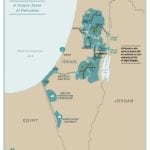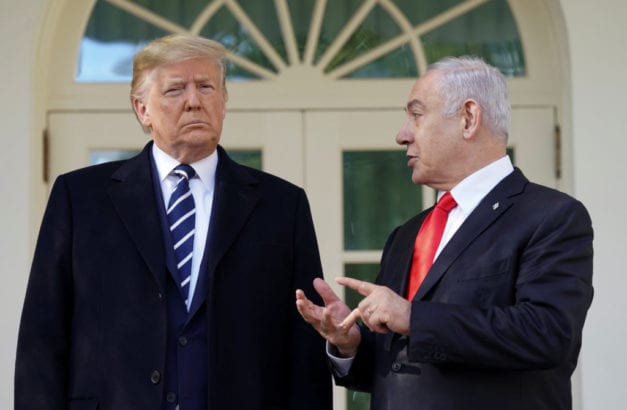Trump released his “Deal of the Century” before a pro-Israel audience at the White House with Prime Minister Benjamin Netanyahu by his side, acknowledging that he has done a lot for Israel, but declaring that he wanted the deal to be a “great deal for the Palestinians.”
The following articles from the New Yorker, UK Guardian, Mondoweiss, Informed comment, and the American Conservative discuss the newly unveiled Trump peace plan for Israel-Palestine known as the “Deal of the Century.” The White House has now posted the 180-page document here.
TRUMP UNVEILS THE “GIVEAWAY OF THE CENTURY” ON MIDDLE EAST PEACE
By Robin Wright, reposted from the New Yorker
Three years after he said that peace in the Middle East was “not as difficult as people have thought,” President Donald Trump unveiled a lopsided plan that gives Israel much of what it has long sought and imposes daunting requirements that the Palestinians must meet before negotiations can even begin. The President described his plan, orchestrated by his son-in-law, Jared Kushner, as “the last opportunity” for a Palestinian state. Yet it fails to address many of the problems that led to the collapse of earlier peace initiatives.
The plan calls for a two-state solution, but largely in name only. It grants Israel’s long-standing demands on settlements and borders, security, Jerusalem, and refugees. Israel will have the right to annex parts of the West Bank that it now occupies, significantly reducing and further dividing Palestinian territory. It gets control of Jerusalem as its “undivided” capital. And it will assume security control over the entire West Bank, the Jordan River Valley, and Jerusalem. The Palestinians will be left with a proto-state that is physically divided, economically challenged, and possibly not viable as a modern country.
Trump’s plan also lacks diplomatic energy—with no formal mechanism to get the two sides together—or any sense of urgency, since it offers a vague four-year window for the Palestinians to complete a long list of preconditions just to talk with Israel.
Netanyahu called the Trump plan “the deal of the century.” Paul Salem, the president of the Middle East Institute, in Washington, D.C., and the son of a former foreign minister of Lebanon, called it the “giveaway of the century”—or “apartheid on steroids.” Daniel Kurtzer, a former U.S. Ambassador to Israel and Egypt, called the plan “the latest example of this administration’s snake oil diplomacy—packaging useless ideas and trying to market them as innovative. Having spent three years punishing Palestinians and distancing U.S. policy from any realistic positions that might lead to peace, the administration has unveiled a plan that Palestinians will justifiably reject, thus giving the administration an opportunity to support annexationist actions by Israel.”
The dim prospects for Trump’s long-delayed peace plan were reflected in the rollout, in the White House East Room, during a noon break in the impeachment hearings. The President was flanked by Prime Minister Benjamin Netanyahu, who praised the “brilliant” proposal as a “realistic path to a durable peace.” But no Palestinians were present. In September, 2018, Trump ordered the Palestine Liberation Organization (P.L.O.) diplomatic mission to close and its diplomats to leave Washington, on the grounds that Palestinians had not done enough on peace. A tattered flag still flies over its red-brick mission near Georgetown, but a big yellow banner underneath declares that the “embassy-style” building is for sale. Palestinian President Mahmoud Abbas, who has participated in previous peace talks, flatly rejected the new plan. “I say to Trump and Netanyahu: Jerusalem is not for sale, all our rights are not for sale and are not for bargain. And your deal, the conspiracy, will not pass.”
The only Arabs present at the White House on Tuesday were the Ambassadors of Oman, Bahrain, and the United Arab Emirates—three out of the twenty-two members of the Arab League. The League is due to meet this weekend to discuss the plan, but most states still firmly back the Palestinians’ core demands—and are likely to say so. Two hours after the plan was rolled out, Netanyahu’s office announced that the Israeli Cabinet will vote on annexing parts of the West Bank on Sunday. Neither event is likely to move the plan forward.
Martin Indyk, a former U.S. Ambassador to Israel, told me that Trump’s proposal isn’t viable because the Palestinians will not accept what amounts to a “Bantustan”—a term for a small black enclave in apartheid South Africa—on just seventy per cent of the West Bank, with only a sliver of East Jerusalem as their capital, and Israeli sovereignty over the Haram al-Sharif, or the Temple Mount, the third holiest site in Islam. “It will also be opposed by the right wing in Israel,” Indyk said, “which is vehemently opposed to a Palestinian state and giving up even one inch of Area C in the West Bank.”
The Trump plan calls for a remapping of the West Bank, including a land swap that would give the Palestinians desert territory disconnected from much of their state in exchange for prime real estate in the middle of the West Bank, according to Ilan Goldenberg, the former chief of staff to the Special Envoy for Israeli-Palestinian Negotiations at the State Department. Refugees who fled the wars in 1948 and 1967 would be granted some form of compensation, “wrapped in very condescending language,” but not even a symbolic number would be allowed to return, Goldenberg, who is now a fellow at the Center for a New American Security, noted. Because the plan has security criteria set by Israel, Israel will decide when the occupation ends. “That is a recipe for a permanent occupation,” Goldenberg said. “If you put it in Israel’s hands, it will never happen.”
Trump’s proposal also calls for the demilitarization of Palestinian areas, including the total disarming of Hamas, which currently controls the Gaza Strip, and all extremist movements. Given the history of conflict in the area, getting all Palestinian factions to surrender weaponry despite Israel keeping all of its arms will be extraordinarily difficult. A long-standing problem in peace efforts has been the division among Palestinians, with P.L.O. politicians running the West Bank and Hamas controlling Gaza since the 2006 elections. (The polls were urged by the Bush Administration as a step toward consolidating the Palestinians into a more unified political whole to facilitate peace. It only further divided the Palestinian rivals.) The Trump plan’s long list of demands also includes an end to all “malign activities” among Palestinian groups, including eliminating the “culture of incitement” in textbooks. To create incentives, the fifty-page plan offers a thirty-page annex of economic plans for the West Bank and Gaza that was unveiled last summer. But it too was rejected by the Palestinians.
“The Trump proposals released today were formally presented as a basis for negotiations, but that’s not in fact how they are structured. They are structured as a diktat,” Tamara Cofman Wittes, a former deputy assistant secretary of state for Near Eastern Affairs who is now at the Brookings Institution, told me. “The Administration has made it clear that it plans to recognize Israeli sovereignty over all the land indicated for the Israelis in Trump’s map, whether the Palestinians accept it or not. That makes the Trump plan an imposed peace.”
Wittes noted that the timing of the plan conspicuously aids Trump and Netanyahu politically. Both men face tough reëlection bids this year, and also perilous legal challenges. The Israeli leader has been indicted on three corruption charges. He is now competing for his political life in the third election in a year. The last two polls failed to produce a government. Benny Gantz, the leader of the Blue and White Party and Netanyahu’s main rival, also endorsed Trump’s plan after he met separately with the President. But Israel faces its own divisions on peace. Naftali Bennett, the former head of the right-wing Jewish Home Party and the defense minister in Netanyahu’s coalition government, said on Tuesday that he and his party would “not allow the government of Israel to recognize a Palestinian state in any eventuality” or cede even a centimeter of land to the Arabs.
The Trump initiative may also face legal challenges, Salem told me. The U.S.’s decision to recognize all settlements on the West Bank as effectively part of Israel violates international law and U.N. Security Council Resolution 242, which emphasizes the inadmissibility of the acquisition of territory by war. The new U.S. plan paves the way for Netanyahu or his successor to annex all the settlements, which comes after the U.S.’s recognition of Israeli occupation of the Golan Heights and the move of the U.S. embassy to Jerusalem. “The U.S. has thus recognized a de facto Greater Israel State” with no conditions on it, he said.
The plan also faces criticism at home. Senator Patrick Leahy, of Vermont, called the plan “farcical,” because it only benefits one party and may hurt America’s image as the only viable broker with all sides. “It is a plan that would diminish the prospects for peaceful coexistence, while damaging our country’s hard-won role as a force for stability in the Middle East,” he said, in a statement.
The conflict between Israel and the Arabs—now in its seventy-second year—is one of the world’s longest. The Trump plan will probably let it rumble on for another four years, with ominous implications for all countries in the volatile Middle East—and, quite possibly, to the benefit of no one.
Robin Wright has been a contributing writer to The New Yorker since 1988. She is the author of “Rock the Casbah: Rage and Rebellion Across the Islamic World.”
Trump unveils ‘realistic two-state solution’ for Middle East peace
by Oliver Holmes in Ramallah, Sufian Taha in Jerusalem and Hazem Balousha in Gaza, reposted from the Guardian
Donald Trump has unveiled his vision for Middle East peace in a White House launch that gifted Israel a wishlist of its long-held demands while promising Palestinians a potential “state”, but with severe restrictions.
Standing next to the smiling Israeli prime minister, Benjamin Netanyahu, Trump announced details of the 80-page plan to cheers and applause. Palestinians leaders were absent from the launch, having pre-emptively rejected his proposal, citing flagrant bias.
“Today, Israel takes a big step towards peace,” Trump said on Tuesday. “I was not elected to do small things or shy away from big problems.”

The Guardian understands that Washington does not intend to press the Palestinians too hard to accept the plan. However, the publication of a set of ideas seen as strikingly favourable to Israeli ultranationalists is likely to embolden the country’s rightwing government to take steps long seen as taboo.
A copy of the plan, released by the White House, said the proposal intended to:
- Establish Jerusalem as Israel’s “undivided” capital, with a potential Palestinian capital in districts to the east and north of the city.
- Recognise the vast majority of Israeli settlements on occupied Palestinian territory as part of the country.
- Recognise the Jordan Valley, which makes up about a third of the occupied West Bank, as part of Israel.
- Offer a path to some form of Palestinian statehood but with no army, and overarching Israeli security control in some areas, including over the sea.
- Recognise sections of the desert bordering Egypt as part of any future Palestinian state.
Trump said the economic portions of the plan, would lead to 1m new jobs for Palestinians over the next 10 years, invest $50bn in the new state and triple its GDP.
“A great plan for Israel”
Netanyahu lauded the proposal as “a great plan for Israel, it’s a great plan for peace”. Critically, he said the “status quo” of Israeli control over the Palestinian territories would remain in place until a deal was reach, which he anticipated would take years.
He added to Trump: “You have been the greatest friend that Israel has ever had in the White House.”
US officials have sought to garner support for the plan from Arab countries, and the ambassadors from the United Arab Emirates, Bahrain and Oman were present on Tuesday. However, representatives from Middle Eastern countries that have been vital to past peace efforts – Saudi Arabia, Egypt and Jordan – did not attend.
Trump invited Netanyahu and his main domestic opponent, Benny Gantz, to the White House this week to discuss the proposal. The Israeli politicians will face off against each other in an election on 2 March, and Washington wanted to ensure the plan would be rolled out regardless of the result.
Gantz later said the plan was a “significant and historic milestone” that he would work to implement if elected.
Earlier this week, Saeb Erekat, the secretary general of the Palestine Liberation Organisation, described it as a “hoax”. The Palestinian ambassador to the UK, Husam Zomlot, said it was “fraud on every count”.
Why now?
Trump and the plan’s chief architect, his son-in-law, Jared Kushner, have delayed the official rollout many times since they first began developing it in 2017.
Releasing it now has been interpreted as a way to distract from Trump’s impeachment trial and to help his ally, Netanyahu. The 70-year-old Israeli leader faces three criminal corruption indictments and an uncertain election campaign in just over a month. On Tuesday, he begrudgingly dropped a request for parliamentary immunity after it appeared certain he would fail to garner enough votes.
The Palestinian prime minister, Mohammad Shtayyeh, said the plan had more to do with Trump and Netanyahu’s legal woes than peace. “This is a plan to protect Trump from impeachment and protect Netanyahu from prison. It is not a Middle East peace plan,” he said.
Small protests were held in the occupied West Bank on Tuesday, with teenagers burning tyres in the street. Larger rallies were planned for Wednesday.
Helpless
In Gaza, over which Israel maintains a tight blockade on people and goods, Ahmed Shafiq, a master’s student, said he felt wronged. “I cannot do anything to reject this plan. There is talk about depriving all rights. No one helps us. We feel we are alone,” he said.
“I am not against peace, but what is being talked about is not peace. Peace is not imposed on people.”
The two main Palestinian political factions, rivals Hamas and Fatah, agreed to hold a rare emergency meeting on Tuesday evening but it was unclear what effect it could have.
Trump’s administration has promoted itself – especially to a large section of US evangelical voters who ardently back the Jewish state – as the most pro-Israel in the country’s history. Washington has already implemented a number of historic changes in the region.
It reversed decades of policy by refraining from endorsing the internationally backed two-state solution. It has also recognised Jerusalem as Israel’s capital, cut millions of dollars in aid to Palestinians, and announced it no longer views Israeli settlements in occupied territory as “inconsistent with international law”.
While it was rumoured the plan would favour settlers, a delegation of leaders from the settlements who travelled with Netanyahu to Washington complained that Palestinians should not be allowed any type of country, even if it was territorially broken up and without an army or an airport.
“Great danger”
Hours before its announcement, several British charities, including Medical Aid for Palestinians and Care International UK, released a joint letter warning that the rights of Palestinians were in great danger.
“There is a major risk that the so-called ‘peace plan’, set to be released imminently, will lead to the formal annexation of Palestinian land, perpetual Israeli occupation, and the negation of Palestinians’ collective right to self-determination,” the letter said.
The ‘Deal of the Century’ is Apartheid
by Sheena Anne Arackal, reposted from Mondoweiss
With great fanfare, President Trump finally unveiled his long-anticipated Middle East peace proposal. The proposal was labeled ‘The Deal of the Century’ because it was supposed to offer an even-handed and just solution to one of the world’s most intractable conflicts. Instead it does something very different. The ‘Deal of the Century’ resurrects and restores grand apartheid, a racist political system that should have been left in the dustbins of history.
Under President Trump’s newly unveiled peace plan, the Palestinians will be granted limited autonomy within a Palestinian homeland that consists of multiple non-contiguous enclaves scattered throughout the West Bank and Gaza. The government of Israel will retain security control over the Palestinian enclaves and will continue to control Palestinian borders, airspace, aquifers, maritime waters, and electromagnetic spectrum. The Palestinians will be allowed to select the leaders of their new homeland but will have no political rights in Israel, the state that actually rules over them.
Netanyahu affirmed the government of Israel will apply Israeli law to Jewish communities in the West Bank, constituting annexation of all Israeli settlements and the Jordan Valley in one swoop.
Shades of South Africa
President Trump’s plan for racial control and segregation should sound disturbingly familiar. Indeed it should immediately bring to mind the Bantu homelands which were the cornerstone of South Africa’s ‘grand apartheid’. While ‘petty apartheid’ was the term used to describe racial segregation on buses and public facilities, ‘grand apartheid’ referred to the many laws which enforced territorial and political separation between black and white South Africans.
The Bantu homelands, which were key to the territorial and political separation of racial groups, had their origin in the Land Acts of 1913 and 1936 which created reserves for the native black population. Then in 1970 the Bantu Homelands Citizenship Act made the native population legal citizens of their Bantustans, denying black South Africans political rights in white South Africa.
The South African government created Bantu homelands in order to claim that South Africa, a state with a majority black population, was actually a state with a majority white population. The Bantu homelands were political sleight of hand; a poorly veiled attempt to give racist ethnic rule the veneer of democratic respectability.
Like South Africa’s grand apartheid, the Trump plan physically and politically separates Palestinians by placing them within a non-contiguous homeland (Areas A and B and Gaza), and declaring them citizens of that homeland.
Like South Africa’s grand apartheid, the Trump plan grants the Palestinian homeland autonomy over civil matters like education and healthcare, while critical areas such as trade, immigration, and security will remain under Israeli control.
Like South Africa’s grand apartheid, the Trump plan is political sleight of hand: a thinly veiled attempt to claim that Israel, a state that rules over roughly the same number of Jews and Palestinians, is actually a Jewish-majority state. Also like apartheid South Africa, the Trump administration claims the homelands are a temporary solution. Once the indigenous population proves itself ready for self-governance they will one day be granted something that resembles a state.
Imposing “peace” by imposing apartheid
Using a combination of financial sticks and carrots, some of which were unveiled last June at the economic summit in Bahrain, the Trump administration will try to force Palestinians to accept the ‘peace plan’ and declare independence within their homeland, just as the apartheid South African government once tried to force the native black population to declare independence within their Bantustans.
While the crony leadership of some Bantustans did indeed declare independence, South Africa’s grand apartheid ultimately failed because local leaders, including the African National Congress and the legendary Nelson Mandela, waged a determined and powerful international campaign against apartheid.
President Trump’s peace plan was labeled the ‘Deal of the Century’ because it was supposed to bring peace and dignity to the people of the Middle East. Instead the ‘peace plan’ does the exact opposite and resurrects apartheid, a racist political system that should have been left in the dustbins of history.
The Trump peace plan cannot, and should not be implemented because it gives Israelis the illusion of security while in reality trapping them within an unstable regime based on racial oppression. The Trump peace plan cannot, and should not be implemented because it gravely violates the rights and dignity of the Palestinian people and very likely constitutes a crime against humanity under the Rome Statute (1998). The Trump peace plan cannot, and should not be implemented because once we look past all the streamers and confetti, it turns out ‘The Deal of the Century’ is nothing less than Apartheid.
Five ways the plan violates international law:
By Juan Cole, excerpted from Informed Comment:
The Trump Plan is full of measures that constitute War Crimes in international law, and a systematic pattern of War Crimes is categorized as a Crime against Humanity. The latter term is the one appropriate to the Trump Plan. Here are the War Crimes the Plan proposes:
1. Israel has flooded 400,000 of its citizens into the Occupied Palestinian West Bank, where they have stolen Palestinian land and built squatter-only settlements on it, where Palestinians are not allowed to live. These Israeli squatters are often armed and some of them routinely stage attacks on Palestinian villages or commit sabotage against Palestinian orchards and agriculture.
This squatting on Palestinian land contravenes the Fourth Geneva Accord of 1949 on Occupied Territories, which forbids transferring populations from the Occupying Power into the occupied lands.
“The Occupying Power shall not deport or transfer parts of its own civilian population into the territory it occupies.”
This rule was to prevent the repetition of the war crimes committed by Nazi Germany, which occupied other lands and sent Germans in to settle them.
The Trump plan rewards Israel’s illegal activities, saying “Approximately 97% of Israelis in the West Bank will be incorporated into contiguous Israeli territory.”
2. The Trump Plan allows Israel to annex about a third of the Occupied West Bank, on which Israeli squatters have squatted. Annexation is an act of aggression, forbidden by international law. By the Fourth Geneva Convention, Israel cannot actually deprive Occupied Palestinians of their land rights by simply declaring those lands “annexed.”
3. The Plan envisages depriving many Israeli citizens of Palestinian heritage of their Israeli citizenship, which amounts to denaturalization. Since they would be instead given “citizenship” in a “state” that no one will recognize and which is a Bantustan rather than a state, in which they will enjoy no actual rights over their own property because Israel won’t permit the Bantustan to so guarantee them, that would amount de facto to forcing these Israeli citizens into statelessness, which contravenes the UN Convention on the Reduction of Statelessness, signed by 75 member states.
4. The Plan envisages that the Palestinian Bantustan will be disarmed, which means that Palestinians will be deprived of the right of self-defense. The Right of Self-defense is recognized in Chapter 7 of the United Nations Charter:
“Article 51. “Nothing in the present Charter shall impair the inherent right of individual or collective self-defence if an armed attack occurs against a Member of the United Nations, until the Security Council has taken measures necessary to maintain international peace and security.”
Palestine was in 2012 granted by the UN General Assembly non-member observer state status, like the Vatican, which puts it under the authority of the Charter.
5. The enclaves to which the Palestinians would be consigned give them no control over their lives, as B’Tselem pointed out.. The Israeli human rights organization pointed out,
“With no territorial contiguity, Palestinians will not be able to exercise their right to self-determination and will continue to be completely dependent on Israel’s goodwill for their daily life, with no political rights and no way to influence their future. They will continue to be at the mercy of Israel’s draconian permit regime and need its consent for any construction or development. In this sense, not only does the plan fail to improve their predicament in any way, but, in fact, it leaves them worse off as it perpetuates the situation and gives it recognition.”
Article 12 of the International Covenant on Civil and Political Rights puts the right to freedom of movement into treaty law: “(1) Everyone lawfully within the territory of a State shall, within that territory, have the right to liberty of movement and freedom to choose his residence.”
Since the over-all rubric is Apartheid, and Apartheid is a War Crime in the Rome Statute that underpins the International Criminal Court, the whole plan is a series of War Crimes, which amount in the aggregate to a crime against humanity.
Is Trump Offering West Bank To Bibi In His ‘Deal Of The Century’?
By Kelley Beaucar Vlahos, reposted from American Conservative, a few days before the plan was released
In his bid to detract from his impeachment and to help out his friend Benjamin Netanyahu, who is under indictment and facing a fierce election March 2, is Trump willing to light the Middle East on fire?
That is what the news suggests this morning. The details are vague but it appears that Trump may be planning to announce his “peace deal of the century” for Israel and the Palestinians soon, and has invited Prime Minister Netanyahu and his political rival Benny Gantz to the White House next week. He has not invited Palestinian leader Mahmoud Abbas, who would be the other signatory if a “peace deal” would in fact be in the offing.
More importantly, reports indicate that the so-called deal might give Israel the green light to annex the Jordan Valley and illegal settlements in the West Bank. This is what Netanyahu has promised Israelis throughout this tumultuous election drama and his own indictment on charges of fraud and bribery, for which he has yet to stand trial. He is on a razor thin tightrope, but despite claims that he was finished (even from these pages!) he has managed to stay on. Trump’s gambit—-giving him everything he asked for right before the election, may be the greatest gift Trump could give.
And what does it do for Trump? On it’s face, it’s all upsides for him politically. He has not been hurt as he has made other brazen moves to put the American thumb on the scale for Israel’s right wing throughout his three-and-a-half-year term—including moving the U.S. embassy to Jerusalem, recognizing Israel’s annex of the Golan Heights, withdrawing aid from Palestinian refugees, and declaring that Jewish settlements in disputed Palestinian territories were not illegal.
If he can bolster his Republican hawk base—think Senators Rubio, Cotton, and Graham—during impeachment, all the better. High profile Democrats are unlikely to make a fuss, either, as many of them are strong supporters of Israel, too. It would be no surprise to see several of them take time from the trial for an audience with Netanyahu when he is here.
Trump was characteristically banal in his comment about the plan Thursday: “It’s a great plan. It’s a plan that really would work,” he told reporters on Air Force One en route to a Republican Party meeting in Florida. Sure, it would work for Netanyahu and the right wing Israelis who have been praying for a U.S. president to act so boldly biased in favor of them for decades. For their part, the Palestinians under Abbas have already rejected Trump’s plan in the works and have cut off all diplomatic ties with Washington, for obvious reasons. There is no “peace” in this plan, the fix was in from the start. The whole business of the deal including a huge economic plan for the Palestinians is hooey and the world knows it—that’s why Trump son-in-law and senior advisor Jared Kushner was widely panned when he announced that piece of the proposal last year.
For all the politics, even Israeli media sees the danger in the course, whether or not the people in Washington give a damn. From Haaretz this morning:
There is a really skewed vision of “peace” in the White House and it has very little to do with foreign policy expertise, or well-informed ideas or plans. Trump has been led by members of his team with specific ideological interests from the start. He and his surrogates were very plain about this during his 2016 campaign. His vice presidential pick, plus his hiring of Pompeo, Bolton, Kushner and appointment of David “Israel is on the side of God” Friedman as U.S. ambassador only cemented it. He has been ratified by his base all the way. God help us if this latest political calculation is the one that goes too far.
Kelley Beaucar Vlahos, executive editor, has been writing for TAC for the last decade, focusing on national security, foreign policy, civil liberties and domestic politics. She served for 15 years as a Washington bureau reporter for FoxNews.com, and at WTOP News in Washington from 2013-2017 as a writer, digital editor and social media strategist. She has also worked as a beat reporter at Bridge News financial wire (now part of Reuters) and Homeland Security Today, and as a regular contributor at Antiwar.com. A native Nutmegger, she got her start in Connecticut newspapers, but now resides with her family in Arlington, Va.
RELATED READING:
Trump Gives Away the Store and Israel Will Now Officially Become an Apartheid State – Consortium News
Experts: Israeli System Constitutes Apartheid, Crime against Humanity
Israel: democracy or apartheid state?
Can you say “Israeli apartheid”? 200 Jewish-only communities approved
For Justice, Not Apartheid, in Palestine
Israel’s New Nation-State Law: Codifying Apartheid – Podcast interview with Alison Weir
At UN Hearing, South African Delegate Decries Israel as “Apartheid State”





